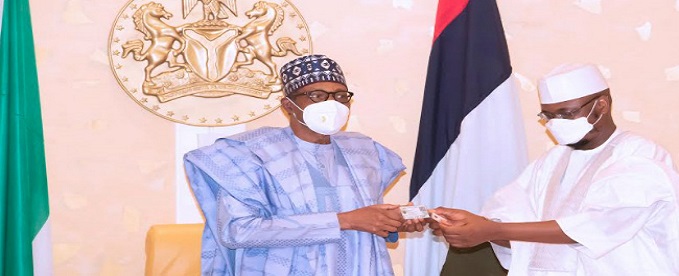Telecom
Buhari Says NIN-SIM Linkage Will Cover Security Structure, Identify Crooks

President Muhammadu Buhari has called on Nigerians to participate in the ongoing synchronization of National Identification Number (NIN) with SIM cards across the country, as it will provide a digital framework for improving security and strengthening the economy.

The President stated this at the launch of the National Policy for the Promotion of Indigenous Content in Nigerian Telecoms Sector and Revised National Identity Policy for SIM Cards registration in Abuja.
He said “The NIN will cover one of the weaknesses in our security structure. We will be able to easily identify and know the personality of Nigerians. We will identify people easily, including the crooks.’’
President Buhari noted that proper identification of all Nigerians and legal residents in the country and the ability to conveniently access a database will provide an impetus for more effective planning and security oversight.
“The launch of the Revised National Digital Identity Policy for SIM Card Registration was quite timely and will support efforts to enhance security and develop the economy.
“The National Identification Number is the foundational digital ID for the country; both Nigerian citizens and legal residents are expected to obtain the NIN. It will provide access to government services and will give government useful insights that will enable us to utilize scarce resources in a more efficient way,’’ he added.
According to him, the first National SIM Policy was launched in February 2020, and the revised policies were in full alignment with the objectives of the administration in the areas of economic development, security, and anti-corruption.
“The Digital Economy sector has made significant progress and recorded a number of unprecedented achievements since we expanded the mandate of the Ministry of Communications to include the digital economy mandate.
“The Information and Communications Technology sector was the fastest growing sector in both the fourth quarter of 2020 and the entire year 2020, based on the Report by the National Bureau of Statistics.
“The sector’s 14.70 percent double-digit growth rate played a principal role in supporting our country to exit the recession triggered by the COVID-19 pandemic. The growth rate of the sector exceeded four times the next fastest-growing sector of Q4 2020, the ICT Sector which had a growth rate of 3.42 percent. This is truly commendable,’’ the President added.
President Buhari said the digital economy sector provided online options for activities that were hitherto restricted to offline channels while minimizing the disruption to activities of both public and private sectors and reducing the cost of meetings.
He added that the National Policy for Indigenous Content in the Nigerian Telecommunications Sector was in line with the administration’s commitment towards ensuring that Nigerians become active participants in the different sectors of the economy, including the telecommunications sector.
“The Federal Government embraced institutionalizing online meetings through the approval of the National Policy on Virtual Engagements in Federal Public Institutions. As a result of this, we now have virtual Federal Executive Council, virtual Council of State and virtual National Economic Council meetings, among others, even though this development was triggered by COVID-19,’’ he said.
“As a country, our desire to produce what we eat, and consume what we produce is not limited to the literal meaning; rather we want to work towards being self-sufficient in every sector of the economy. For the telecom sector, we want Nigerians to play a major role in the design and manufacture of devices, in meeting the manpower requirements, and in becoming an active part of the telecommunications ecosystem of the country.
“The policy aims to achieve this and I have earlier directed the Honourable Minister of Communications and Digital Economy, Dr. Isa Ali Pantami, to develop the structure for its implementation and forward this to the Nigerian Communications Commission to implement. We are confident that the execution of the Policy will further enhance our economy and lead to the creation of jobs,’’ the President noted.
President Buhari said there had been many futile attempts to promote the use of digital identity in the past: “Previous attempts have been unsuccessful due to a number of reasons, including sabotage. Our focused approach shows that this administration is dedicated to ensuring that we derive the benefits of a secure and robust digital identity system.’’
He assured that his administration was fully committed to the safety of Nigerians and linking the SIM to NIN will significantly enhance security, aid in national planning and budget preparations.
In his remarks, Dr. Isa Ali Pantami, minister of Communications and Digital Economy appreciated the President for the continuous support to the telecoms sector, including regulators and operators, thanking him for the keen interest in ensuring that the security sector gets a boost with more information on Nigerians and legal residents.
The minister noted that the NIN Registration had recorded a huge success with 54 million Nigerians already captured in the process, adding, “within six months over 12 million enrolled.’’
Dr Pantami said it was now possible to have virtual ID cards that can be used in various transactions, assuring that the NIN and Sim card registration for Nigerians and legal residents will cover 99.9 percent.
He said the buoyancy of the telecoms sector had given Nigeria many leadership roles in international organisations, listing the impact on education, training, health, and welfare of many, including the establishment of 600 computer centres, and a world-class sim card manufacturing company in the country.
Telecom
MTN, Lynk Global Make Africa’s First Satellite-to-Mobile Call

MTN South Africa, in partnership with Lynk Global, has successfully conducted Africa’s first satellite-to-mobile phone call touted as a groundbreaking development.

This historic trial, conducted in Vryburg, North West province, marks a major step toward bridging connectivity gaps in underserved and rural regions across the continent.
The test involved making a voice call using a standard smartphone connected via a low-Earth orbit (LEO) satellite.
This innovative approach eliminates the need for traditional network infrastructure, providing a viable solution for remote areas with limited or no mobile coverage.
According to Charles Molapisi, CEO of MTN South Africa, this initiative aligns with the company’s broader strategy to extend network coverage to hard-to-reach areas.
“This achievement demonstrates our commitment to leveraging cutting-edge technology to ensure connectivity for all, regardless of location,” Molapisi stated.
The trial also assessed SMS capabilities over the LEO satellite connection, proving the technology’s potential for widespread application.
With successful implementation, satellite-to-mobile communication could revolutionise telecommunications in Africa, enabling digital inclusion and economic opportunities in regions previously disconnected from mainstream networks.
This milestone underscores the growing role of satellite technology in Africa’s telecommunications landscape.
By integrating satellite solutions with existing mobile networks, MTN and Lynk Global aim to provide seamless connectivity that overcomes traditional infrastructure challenges.
Telecom
Smart Treasure Investment Team’s Initiatives Eradicate Poverty, Says Aminu

Samson Aminu, also known as Smile, has described the Smart Treasure Investment Team (ST Team) as a transformative force that has empowered its members and significantly contributed to poverty eradication.

Samson Aminu
Aminu, a VIP 9 member of the team, shared his experiences on Friday during the official car presentation ceremony held at the regional office in Lagos. Having recently received a Lexus RX350 and an international vacation from the team, Aminu recounted how the organization has positively changed his life.
“The Smart Treasure Investment Team has really imparted my life positively and changed my status from zero to hero,” he said.
He revealed that his first earnings through the team allowed him to relocate to a new apartment and acquire gadgets. “I’ve purchased various items for myself and my family, and established an operational center in Ilorin,” he added.
The ST Team, according to Aminu, aligns its activities with the United Nations’ 16 Sustainable Development Goals (SDGs), which include youth empowerment, poverty eradication, support for education in rural areas, and community service.
“The ST Team has come to eradicate poverty in Africa and across the globe. We are teaching people how to catch fish by themselves and making them financially stable,” Aminu explained.
He highlighted the organization’s initiatives such as providing allowances to civil servants, feeding the elderly, orphans, and widows, and investing in agriculture to sustain local communities.
“If the ST Team lasts long for another three years, the government would be grateful to this project as it would bring peace and comfort to the society,” Aminu said.
He applauded the leaders of the organization, Dr. Harold and Mentor Tina, for their sincerity, honesty, and dedication to humanity. “I urge the government to support this project, which has brought significant change to Nigeria in just two years,” he said.
Aminu, who has over 15 years of experience in multilevel marketing, commended the team for its exceptional standards and sustainability.
Telecom
15-Year-Old Autistic Artist, Kanye, to Unveil World’s Largest Art Canvas on Autism Awareness Day

Kanyeyachukwu Tagbo-Okeke, affectionately known as Kanye, has become a beacon of inspiration for Nigeria’s youth. The 15-year-old autistic artist is set to unveil what is expected to be the world’s largest art canvas by an individual on April 2, 2025, World Autism Awareness Day, at Eagles Square in Abuja.

Kanye’s journey began at the tender age of two when he first showed a proclivity towards art. Despite facing challenges associated with autism, Kanye has flourished as an artist, earning accolades and the nickname “Young Picasso” for his exceptional abstract paintings.
The young prodigy’s attempt at breaking the Guinness World Record started in November. 2024, as part of the Zeebah Foundation’s ‘Impossibility Is A Myth’ project. This initiative not only showcases Kanye’s extraordinary talent but also aims to raise funds for a state-of-the-art autism resource center in Abuja, highlighting the need for greater support and inclusion for individuals with autism.
Kanye’s story aligns with MTN Nigeria’s recent “Go Make A Difference” (Go M.A.D) campaign, which encourages Nigerians to take bold steps and create positive impacts in their communities. Onyinye Ikenna-Emeka, MTN’s Chief Marketing Officer, emphasised how Kanye embodies the Go M.A.D philosophy: “MTN’s mission is to connect people all over the world. Kanye is connecting art lovers, and people all over the world as well. He is a true icon, breaking barriers and proving that nothing is impossible”.
The unveiling event will be attended by key dignitaries, including FCT Minister Nyesom Wike, and Minister of Arts, Culture, Tourism and the Creative Economy, Hannatu Musawa. This high-profile support underscores the significance of Kanye’s achievement and its potential to inspire change.
Kanye’s father, Tagbo Okeke, stressed that this record attempt goes beyond personal achievement. “We started this awareness campaign to tell parents that no child should be left behind, that they are Fabulous, Autistic and Talented,” he said. The family’s efforts, including opening a gallery in Abuja where art therapy workshops are conducted, demonstrate their commitment to supporting others on the autism spectrum.
As Nigeria’s youth witness Kanye’s remarkable journey, many are inspired to make their own difference, regardless of the challenges they face. Kanye’s story proves that with determination, support, and the right tools – such as those provided by initiatives like MTN’s Go M.A.D campaign – young Nigerians can achieve extraordinary feats and create meaningful change in their communities.
Kanye’s upcoming unveiling of his monumental artwork is not just a personal triumph; it’s a powerful statement about inclusion, perseverance, and the limitless potential of Nigeria’s youth to make a difference.

 Telecom2 days ago
Telecom2 days agoIHS Nigeria Hosts Telecom Industry Stakeholders to Discuss Protection of Critical National Infrastructure in Lagos State

 E-Financial2 days ago
E-Financial2 days agoTitan Trust Bank Selects Oracle FSS for Core and Digital Banking Technology

 General News2 days ago
General News2 days agoNCS to Launch Electronic System for Cash Declarations at Airports

 News2 days ago
News2 days agoSanwo-Olu Hails Jumia for Giant Strides in Growing Nigeria’s E-Commerce Sector

 E-Financial2 days ago
E-Financial2 days agoIMF Appoints Elumelu, Nigerian Businessman to Advisory Council

 Telecom2 days ago
Telecom2 days agoMTN Champs Continental Relays: Over 1,000 Athletes Gear Up for Lagos Showcase

 General News2 days ago
General News2 days agoAquaterra Energy Secures Multi-million-dollar well Intervention Contract with Intrepid Energy in Nigeria

 E-Financial6 hours ago
E-Financial6 hours agoNigeria Gets Fresh $500m World Bank Loan for Economic Stimulus Programme
























